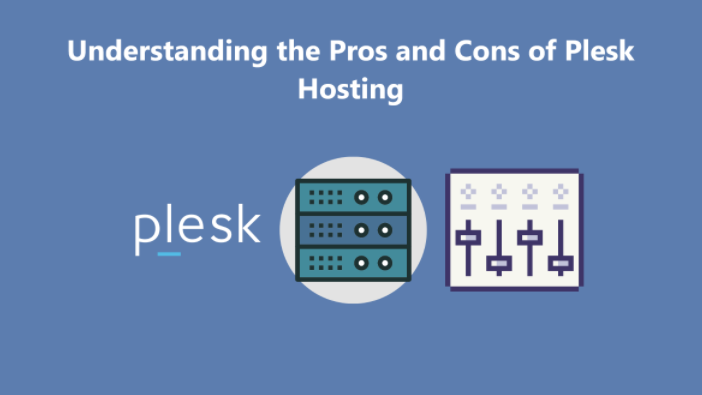Pros and Cons of Plesk Hosting – Plesk is one of the most popular web hosting control panels, offering a range of tools and features for managing websites, servers, and applications. While it is widely praised for its ease of use and versatility, it may not be the perfect solution for everyone. Let’s explore the advantages and disadvantages of Plesk hosting to help you determine if it’s the right choice for your hosting needs.
Pros and Cons of Plesk Hosting

Table of Contents
Here the list of Pros and Cons of Plesk Hosting
Pros of Plesk Hosting
1. User-Friendly Interface
Plesk is designed with a clean, intuitive interface that simplifies the management of websites, domains, email accounts, and server settings. This makes it an excellent choice for both beginners and advanced users.
2. Cross-Platform Compatibility
Unlike some control panels that are exclusive to Linux, Plesk supports both Linux and Windows servers. This makes it ideal for hosting environments with diverse requirements.
3. Wide Range of Features
Plesk offers robust features, including:
- One-click installations for popular applications like WordPress, Joomla, and Drupal.
- Built-in security tools like firewalls and Let’s Encrypt for SSL management.
- Advanced email management with anti-spam and anti-virus protection.
4. Extensive Extension Library
Plesk has a marketplace full of extensions to enhance its functionality. Whether you need SEO tools, backup solutions, or e-commerce integrations,Pros and Cons of Plesk Hosting Plesk provides add-ons to customize your hosting experience.
5. Ease of Automation
From scheduling backups to automating updates, Plesk minimizes manual intervention, saving time and effort.
6. Reseller-Friendly
Plesk is an excellent choice for resellers, as it allows for seamless account management, resource allocation, and customization options for clients.
Cons of Plesk Hosting
1. Cost
Plesk is not free, and its licensing fees can add to the overall cost of hosting. For users on a tight budget, this might be a disadvantage compared to free alternatives like Webmin.
2. Resource Intensive
Plesk’s feature-rich environment can demand more server resources, potentially impacting performance on lower-spec servers.
3. Learning Curve for Advanced Features
While Plesk is beginner-friendly, mastering its advanced features and extensions may require some time and effort, especially for users without technical experience.
4. Extension Dependency
Many advanced features require third-party extensions, which may incur additional costs or introduce compatibility issues.
5. Limited Customization
Compared to some open-source control panels, Plesk offers less flexibility for users who prefer full customization of their hosting environment.
Understanding the Pros and Cons of Plesk Hosting
Plesk hosting remains one of the leading choices for managing web hosting environments due to its powerful features and user-friendly interface. However, like any tool, it comes with its strengths and limitations. Here’s a deeper dive into the pros and cons of using Plesk hosting to help you make an informed decision.
Expanded Pros of Plesk Hosting
1. Comprehensive Website Management
Plesk simplifies website management by offering tools for domain configuration, email account setup, file management, and database administration, all accessible in one place.
2. Built-In WordPress Toolkit
Plesk’s WordPress Toolkit provides features like one-click installations, staging environments, automatic updates, and enhanced security options specifically tailored for WordPress websites.
3. Multi-Language Support
Plesk supports multiple languages, making it suitable for users and teams from diverse linguistic backgrounds, catering to a global user base.
4. Developer-Friendly Environment
Plesk is equipped with tools that cater to developers, such as:
- Support for multiple programming languages (PHP, Ruby, Python, etc.).
- Git integration for streamlined version control.
- Docker support for containerized applications.
5. Scalability for Growing Needs
Plesk is ideal for businesses that expect growth. It accommodates additional websites, accounts, and applications without significant changes to the hosting environment.
6. Enhanced Security Features
With firewalls, fail2ban intrusion prevention, and Let’s Encrypt SSL integration, Plesk prioritizes security, helping protect your websites and data from cyber threats.
7. Centralized Control for Multi-Site Management
Pros and Cons of Plesk Hosting -Managing multiple websites becomes seamless with Plesk’s centralized control panel. It allows users to switch between projects effortlessly and manage domains, files, and resources efficiently.
8. Regular Updates and Support
Plesk frequently updates its platform to enhance functionality, fix bugs, and introduce new features. Additionally, it offers robust customer support and extensive documentation for troubleshooting.
Expanded Cons of Plesk Hosting
1. Licensing Costs Can Add Up
Plesk offers various licensing tiers based on the number of domains or accounts you manage. For users with large-scale requirements, licensing can become expensive over time.
2. Compatibility Challenges
While Plesk supports a wide range of applications, some advanced configurations or third-party extensions may occasionally face compatibility issues, leading to downtime or added troubleshooting.
3. Performance on Low-End Servers
Hosting Plesk on entry-level or underpowered servers might lead to performance bottlenecks, especially if running resource-intensive applications or managing multiple sites.
4. Dependence on Internet Connection
Pros and Cons of Plesk Hosting -Plesk is web-based, meaning that access requires a stable internet connection. Any connectivity issues can disrupt management tasks.
5. Customization Limitations for Advanced Users
While Plesk provides ample features for most users, developers looking for deep system-level customization may find it less flexible compared to open-source alternatives.
6. Overhead for Beginners
Although Plesk is designed to be user-friendly, beginners with no prior experience in hosting management may still find the vast array of options overwhelming initially.
7. Dependency on Extensions
Pros and Cons of Plesk Hosting – While Plesk’s extension marketplace is a strength, reliance on third-party extensions can introduce costs and potential risks if extensions are not maintained or supported.
8. Windows Hosting Can Be Complex
While Plesk’s compatibility with Windows servers is a notable advantage, managing a Windows environment often involves more complexity and licensing considerations than Linux servers.Pros and Cons of Plesk Hosting
Conclusions
Plesk hosting strikes a balance between ease of use and robust functionality, making it a versatile choice for individuals, small businesses, and large organizations. Whether you’re managing a single website or hosting for clients, its feature set is designed to simplify operations and enhance productivity.
However, understanding the limitations of Plesk hosting is crucial to avoid surprises down the line. Businesses must evaluate their budget, server capacity, and technical requirements to determine if Plesk aligns with their goals. Pros and Cons of Plesk Hosting For those seeking a reliable, scalable, and user-friendly hosting control panel, Plesk often stands out as a top contender.
With its adaptability for both Linux and Windows environments, along with its extensive toolkit, Plesk remains a cornerstone in modern web hosting solutions. But if cost or resource usage is a concern, exploring alternatives or tailoring hosting needs could offer a better fit.
Plesk hosting offers a powerful, user-friendly solution for managing websites, servers, and applications. Its cross-platform compatibility, extensive feature set, and Pros and Cons of Plesk Hosting automation capabilities make it a great choice for businesses, developers, and resellers. However, it’s essential to weigh the costs, resource requirements, and limitations to ensure it aligns with your specific needs.
Whether you’re managing a personal website or hosting multiple client sites, understanding the pros and cons of Plesk Pros and Cons of Plesk Hosting can help you make an informed decision.

